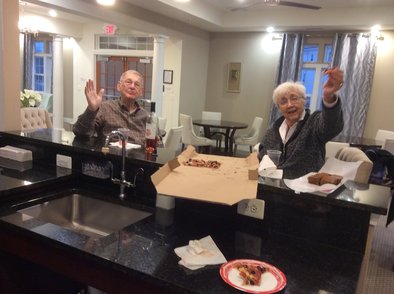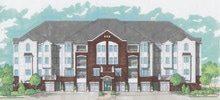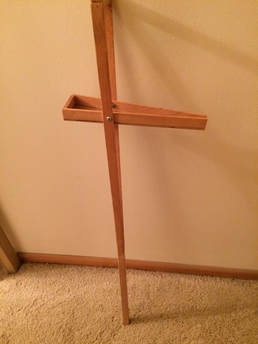Community Mailbox
A Mailbox With a Purpose
This is the page where a wide variety of comments, suggestions, constructive criticism, praise and community snapshots concerning the various facets of our condo life will be posted. Everything from words on the work of the Board of Directors and various committees to ideas on how to make our condo life and health better will find their way here. So will comments on our budgets and spending. Cost saving recommendations will also be welcome. We're anxious to see what our community has to say about itself.
Constructive Name Calling
One of our unit owners, Pat J. Martin, saw the following article in the Washington Post and thought many of our other residents would enjoy and perhaps, agree with the observations and conclusions the author makes.
'Geezers' 'coots' or 'the elderly': What we call 'old'
BY LAURA L. CARSTENSEN
We hear a lot about aging societies these days. At the same time, we hear relatively little about being old from older people themselves. In part, this is because most people in their 60s, 70s and older still don't think of themselves as "old." We often refer to old people in the third person.
As long as we are healthy and engaged in life - as most people in their 60s, 70s and older are – we don't view ourselves as old. But by using "they" rather than "we" in our minds and our conversations, we keep an entire stage of life at arm's length. By failing to identify with "old," the story about old people remains a dreary one about loss and decline.
Language matters: We need a term that aging people can embrace.
For years, I've thought that we should just start calling ourselves old and be proud of the fact that we've reached advanced ages. Maggie Kuhn, who co-founded the anti-ageism group Gray Panthers, also took this position.
I first heard Kuhn speak in the late 1970s at the meetings of the Gerontological Society of America. A distinguished geriatrician introduced her in a hotel ballroom to a standing-room-only crowd. He concluded his gracious introduction by saying something to the effect of, "And now it is my great pleasure to give you this impressive young lady." Kuhn ambled to the podium, stood silent for a moment, pulled the microphone down to her mouth (she was as short as she was fierce) and slowly and forcefully said, "Two things: I am not young, and I'm no lady. I am an old woman. And the fact that you cannot call me what I am without insulting me illustrates the depth of the problem we face."
I instantly idolized her. But embracing the term “old" is probably a fool's errand. Over the past 40 years or so, I've tried to persuade people to use the word "old" proudly, but I have so far failed to get a single person to do so. In fact, even I avoid "old" for fear that the term might offend.
Alternative terms range from distant but respectful to outright patronizing. None of them are
appealing to old people. The most widely used are "senior citizens," "retirees," "the elderly"
and elders." Then there are the derogatory terms, such as "geezers" and "coots," mostly
whispered behind closed doors. And there are terms such as "sages,” which frankly go too far in the opposite direction, as plenty of old people are a far cry from wise. Some people prefer the
comfortably· familiar term "boomers," But then what do we call Gen Xers and millennials
when they grow old?
There are those who argue that we need to distinguish the young-old from the old-old. Although
I suspect this is touted mostly by baby boomers who want to deny that they are old, it's true that
65-year-olds are not the same as 95-yearolds It is also true-that chronological age is a poor marker
of functioning. Even though the youngold differ from the old-old, there is tremendous
heterogeneity within age groups. The functional status of "old people" has also shifted substantially
over historical time. A century ago, 40 was old. Today's older generations are healthier, more
cognitively fit and better educated than any previous generation.
So, what do we call old people?
The Stanford Center on Longevity, which I direct, strives to develop a culture that supports long life, and we recognized early that language matters. Most people say that they don't want to grow old, but they also want to live a long time, Yet, we've never settled on a good term for old people.
Last spring, I met Maureen Conners, a fascinating woman who works in fashion technology, an
emerging longevity industry (that is, a business providing the needs of older people, including
education, travel and entertainment). She uses the word "perennials" to refer to older customers.
Upon first hearing this term, I was startled. The symbolism it connotes is perfect. For one,
"perennials" makes clear that we're still here, blossoming again and again. It also suggests a new
model of life in which people engage and take breaks, making new starts repeatedly. Perennials
aren't guaranteed to blossom year after year, but given proper conditions, good soil and nutrients,
they can go on for decades. It's aspirational.
In August, Allure magazine announced that it would no longer use the term "anti-aging" and
appointed Dame Helen Mirren their spokeswoman. Jane Fonda and Lily Tomlin are starring in a
wonderful series called "Grace and Frankie" in which they portray two smart, funny and unapolo
getic perennials.
Perhaps we are reaching a tipping point - a shift away from the fear of growing old and toward
embracing living long. "Perennials", may just move the conversation along.
The writer is professor of psychology and the Fairleigh S. Dickinson Jr. professor in public policy at Stanford University.
BY LAURA L. CARSTENSEN
We hear a lot about aging societies these days. At the same time, we hear relatively little about being old from older people themselves. In part, this is because most people in their 60s, 70s and older still don't think of themselves as "old." We often refer to old people in the third person.
As long as we are healthy and engaged in life - as most people in their 60s, 70s and older are – we don't view ourselves as old. But by using "they" rather than "we" in our minds and our conversations, we keep an entire stage of life at arm's length. By failing to identify with "old," the story about old people remains a dreary one about loss and decline.
Language matters: We need a term that aging people can embrace.
For years, I've thought that we should just start calling ourselves old and be proud of the fact that we've reached advanced ages. Maggie Kuhn, who co-founded the anti-ageism group Gray Panthers, also took this position.
I first heard Kuhn speak in the late 1970s at the meetings of the Gerontological Society of America. A distinguished geriatrician introduced her in a hotel ballroom to a standing-room-only crowd. He concluded his gracious introduction by saying something to the effect of, "And now it is my great pleasure to give you this impressive young lady." Kuhn ambled to the podium, stood silent for a moment, pulled the microphone down to her mouth (she was as short as she was fierce) and slowly and forcefully said, "Two things: I am not young, and I'm no lady. I am an old woman. And the fact that you cannot call me what I am without insulting me illustrates the depth of the problem we face."
I instantly idolized her. But embracing the term “old" is probably a fool's errand. Over the past 40 years or so, I've tried to persuade people to use the word "old" proudly, but I have so far failed to get a single person to do so. In fact, even I avoid "old" for fear that the term might offend.
Alternative terms range from distant but respectful to outright patronizing. None of them are
appealing to old people. The most widely used are "senior citizens," "retirees," "the elderly"
and elders." Then there are the derogatory terms, such as "geezers" and "coots," mostly
whispered behind closed doors. And there are terms such as "sages,” which frankly go too far in the opposite direction, as plenty of old people are a far cry from wise. Some people prefer the
comfortably· familiar term "boomers," But then what do we call Gen Xers and millennials
when they grow old?
There are those who argue that we need to distinguish the young-old from the old-old. Although
I suspect this is touted mostly by baby boomers who want to deny that they are old, it's true that
65-year-olds are not the same as 95-yearolds It is also true-that chronological age is a poor marker
of functioning. Even though the youngold differ from the old-old, there is tremendous
heterogeneity within age groups. The functional status of "old people" has also shifted substantially
over historical time. A century ago, 40 was old. Today's older generations are healthier, more
cognitively fit and better educated than any previous generation.
So, what do we call old people?
The Stanford Center on Longevity, which I direct, strives to develop a culture that supports long life, and we recognized early that language matters. Most people say that they don't want to grow old, but they also want to live a long time, Yet, we've never settled on a good term for old people.
Last spring, I met Maureen Conners, a fascinating woman who works in fashion technology, an
emerging longevity industry (that is, a business providing the needs of older people, including
education, travel and entertainment). She uses the word "perennials" to refer to older customers.
Upon first hearing this term, I was startled. The symbolism it connotes is perfect. For one,
"perennials" makes clear that we're still here, blossoming again and again. It also suggests a new
model of life in which people engage and take breaks, making new starts repeatedly. Perennials
aren't guaranteed to blossom year after year, but given proper conditions, good soil and nutrients,
they can go on for decades. It's aspirational.
In August, Allure magazine announced that it would no longer use the term "anti-aging" and
appointed Dame Helen Mirren their spokeswoman. Jane Fonda and Lily Tomlin are starring in a
wonderful series called "Grace and Frankie" in which they portray two smart, funny and unapolo
getic perennials.
Perhaps we are reaching a tipping point - a shift away from the fear of growing old and toward
embracing living long. "Perennials", may just move the conversation along.
The writer is professor of psychology and the Fairleigh S. Dickinson Jr. professor in public policy at Stanford University.
Helping In The Community
Tim and Kirsten Fisher write: We attended a non-religious meeting recently with about 300 people which advocated inclusion and supporting progressive social programs - affordable housing, public education programs, elderly programs, better policing in immigrant communities, etc.. Thought there might be some interest in the GAW community. More details here:
A Little Quiz...
On another subject the Fishers recently discovered an unusual device in Kirsten's late father's home in Iowa and pose this question, "Do you know what it is?" It's pictured at the left below. As a hint to what it is we've also included a photo of two other wooden devices with a similar sounding name. One other hint: The unknown device is used to keep your shoes dry when you are hiking in the woods.
If you'd like the answer to what the unknown device is use the contact form in the "Contact" section of the website to either submit an answer or to get the answer to find out what this whimsical tool is used for.
Restaurant Review
Submitted by Debi Levi
We tried the new Thai Tyme restaurant across the street in the ReStore shopping center. It was awesome! We had crispy beef and pineapple fried rice with shrimp. The prices are very reasonable and the food is excellent! The serve both lunch & dinner and it's very conveniently located for us. Try it... You'll like it!
For photos of Thai Tyme and a complete menu with prices click here.
Hours:
Mon-Thu: 11:00 am - 9:30 pm
Fri: 11:00 am - 10:00 pm
Sat: 11:30 am - 10:00 pm
Sun: 11:30 am - 9:30 pm
(703) 530-8888
We tried the new Thai Tyme restaurant across the street in the ReStore shopping center. It was awesome! We had crispy beef and pineapple fried rice with shrimp. The prices are very reasonable and the food is excellent! The serve both lunch & dinner and it's very conveniently located for us. Try it... You'll like it!
For photos of Thai Tyme and a complete menu with prices click here.
Hours:
Mon-Thu: 11:00 am - 9:30 pm
Fri: 11:00 am - 10:00 pm
Sat: 11:30 am - 10:00 pm
Sun: 11:30 am - 9:30 pm
(703) 530-8888
Friday Social

It doesn't take a big crowd to enjoy a Friday's Social.
While indulging in Betty & Johnny's Bldg # 4, delicious thin crust pizza and Maureen and Claudette's Banana Nut Bread Bldg#1, great fun was had sharing stories of travels and intimate moments with Family.
Sent by Claudette Sylvester March 17, 2017
Click the button to send your comment. It will be posted on this page.





